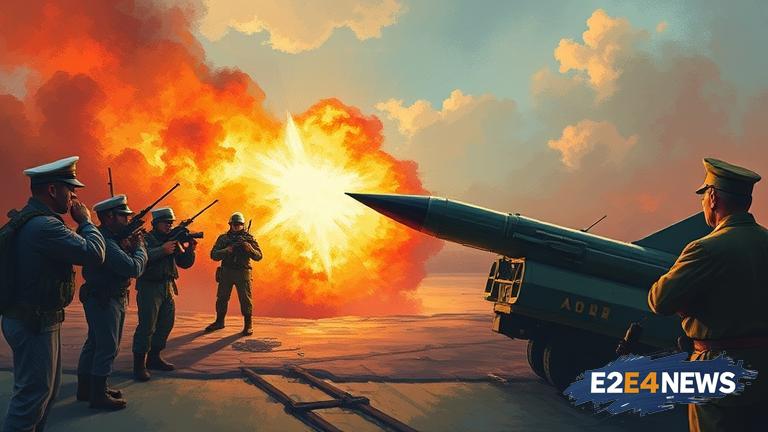In a move that has sent shockwaves throughout the international community, Russia has declared that it will no longer abide by its self-imposed moratorium on missile development and deployment. This decision has significant implications for global security and has raised concerns about the potential for an arms race. The moratorium, which was initially put in place to ease tensions and promote disarmament, has been a cornerstone of international efforts to reduce the threat of nuclear war. However, Russia’s decision to abandon this commitment has sparked fears that the country may be seeking to expand its military capabilities and challenge the global balance of power. The move has been met with widespread criticism from Western nations, who have accused Russia of undermining international security and stability. The United States, in particular, has expressed concern about the potential consequences of Russia’s actions, citing the need for continued diplomacy and cooperation to prevent the escalation of tensions. Despite these concerns, Russia has shown no signs of backing down, with officials insisting that the country’s actions are necessary to ensure its national security and protect its interests. The decision to abandon the moratorium has also been seen as a response to the United States’ withdrawal from the Intermediate-Range Nuclear Forces Treaty (INF), which was a key agreement aimed at reducing the threat of nuclear war. Russia has long argued that the US withdrawal from the treaty was a provocative move that undermined the international security architecture. The abandonment of the moratorium has significant implications for the global non-proliferation regime, which has been under strain in recent years due to rising tensions between major powers. The move has also raised concerns about the potential for a new arms race, as countries seek to develop and deploy new military technologies to counter perceived threats. In response to Russia’s decision, the international community has called for renewed diplomacy and cooperation to address the underlying issues driving tensions and to prevent the escalation of the conflict. The United Nations has urged all parties to engage in constructive dialogue and to work towards finding a peaceful resolution to the crisis. Meanwhile, experts have warned that the abandonment of the moratorium could have far-reaching consequences, including the potential for a destabilization of the global security landscape and an increased risk of conflict. As tensions continue to rise, the international community remains on high alert, with many calling for calm and restraint to prevent the situation from spiraling out of control. The developments have also sparked a heated debate about the role of diplomacy and international cooperation in preventing the escalation of conflicts. While some have argued that the abandonment of the moratorium is a clear indication of the failure of diplomacy, others have insisted that dialogue and cooperation remain the best way to address the underlying issues driving tensions. As the situation continues to unfold, one thing is clear: the abandonment of the moratorium has significant implications for global security and has raised concerns about the potential for an arms race. The international community will be watching closely as events unfold, with many hoping that diplomacy and cooperation can still prevail to prevent the escalation of the conflict. In the meantime, Russia’s decision to abandon the moratorium has sent a clear signal that the country is committed to expanding its military capabilities and challenging the global balance of power. The move has also highlighted the need for renewed efforts to address the underlying issues driving tensions and to prevent the escalation of the conflict. As the world waits with bated breath to see how events will unfold, it is clear that the abandonment of the moratorium has significant implications for global security and has raised concerns about the potential for an arms race.





